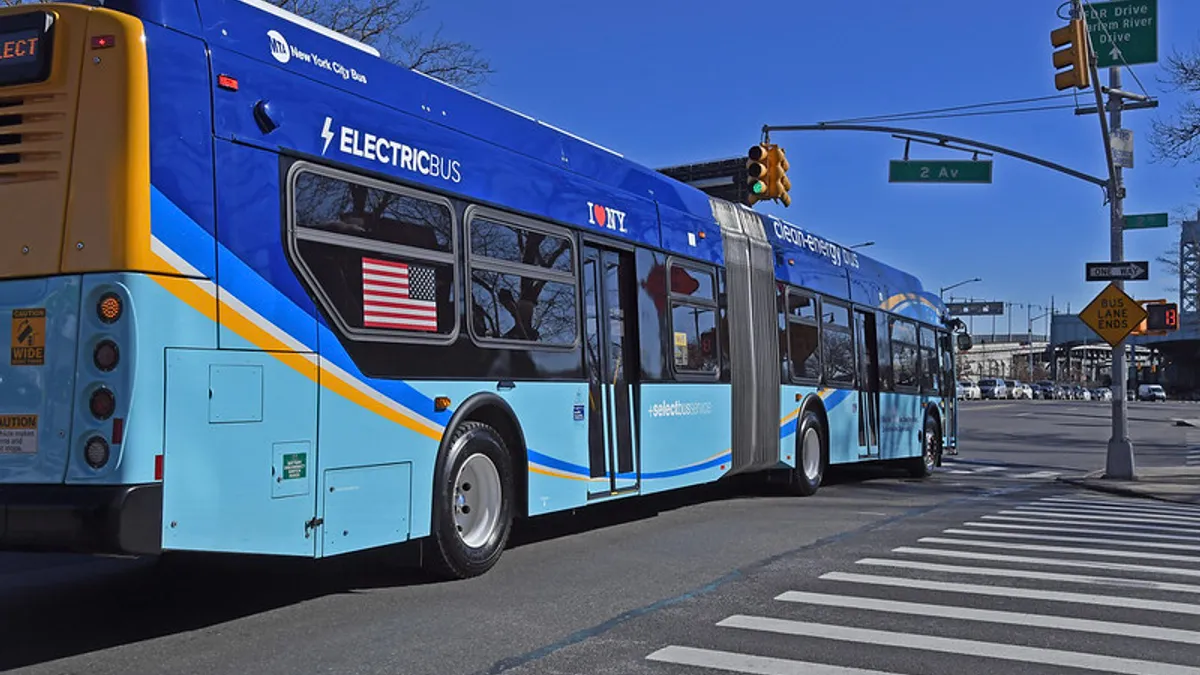Dive Brief:
- The city council of Charlotte, North Carolina, recently approved a public-private partnership between the Charlotte Area Transit System (CATS) and Duke Energy subsidiary eTransEnergy for a pilot program testing the feasibility of battery electric bus vehicles in the city and surrounding area.
- The partnership — which still must be finalized between the two parties — will test 18 vehicles from three different manufacturers over 12 to 18 months and is expected to begin in early 2022. CATS will collect data and assess vehicle performance with an eye toward future deployment of more electric buses.
- The project is supported by the Bloomberg Philanthropies American Cities Climate Challenge. A $3.7 million grant from the Federal Transit Administration (FTA) will fund six of the 18 vehicles, with the rest being paid for by the CATS Capital Investment Program.
Dive Insight:
Despite setting zero-emission transportation goals, many cities have been slow to electrify their bus fleets. The vehicles come with a high upfront cost and must be able to withstand long and frequent routes for years to justify the investment.
Some cities are also not prepared for the logistical challenges that come with charging such large fleets. A report from the Center for Transportation and the Environment released this month found that more than 1,300 zero-emission bus vehicles have been delivered or awarded to U.S. transit agencies, representing about 2% of the national fleet. The report also estimated that a nationwide transition to battery electric and fuel cell electric buses is possible by 2035, but would cost between $56 billion and nearly $89 billion.
The Charlotte pilot represents a path cities could take to get over some of those logistical hurdles. The pilot will test vehicles from three different manufacturers to see which can best handle the city’s weather, topography and needs. At the end of the pilot, the eTransEnergy will help transition the entire CATS bus fleet with the manufacturer that performed best.
Greg Fields, an eTransEnergy vice president, said the pilot will also be an opportunity for the company to provide technical and educational support for Charlotte. Fields said the Duke Energy subsidiary is working on similar agreements with other cities that should be announced in the coming months.
"The planning that goes into bus fleets is different than installing a charger or plugging in an electric vehicle in your garage," said Fields. "There’s a big energy draw with these larger vehicles, we want to make sure our customers are educated and know what they can do on their end of the meter… We want to help our customers implement rather than giving them a report that just goes on the shelf."
President Joe Biden’s proposed American Jobs Plan infrastructure package includes $25 billion to support electric transit vehicles, as well as $85 billion in transit modernization funding. Separately, a Senate bill proposed by majority leader Chuck Schumer, D-N.Y., and Sen. Sherrod Brown, D-Ohio, would invest $73 billion to electrify upwards of 70,000 buses.
Meanwhile, other cities have taken their own steps to turnover their fleets. New York Metropolitan Transit Authority plans to spend $1.1 billion to deploy 500 electric buses through 2024; the FTA’s clean bus funding program helped support 41 governments purchase electric buses or charging equipment in 2020; and California has a target of a 100% zero emission bus fleet by 2040.
In an email, Kelly Shultz, lead for sustainable cities and the American Cities Climate Challenge at Bloomberg Philanthropies, said more pilots like the one in Charlotte can show that "electric buses are a popular and economically feasible climate action strategy," especially when multiple funding sources defray the upfront costs.
"Charlotte demonstrated how cities can place health equity front and center in their electric bus rollouts," Shultz said. "By prioritizing 'Corridors of Opportunity,' under-invested areas of the region that also experience the worst exposure to air pollution, Charlotte is ensuring that the benefits of this climate action strategy are felt by the communities that need them most. Both of these learnings go to show how a similar funding model and health equity focus can be effective strategies for accelerating the adoption of electric buses."












